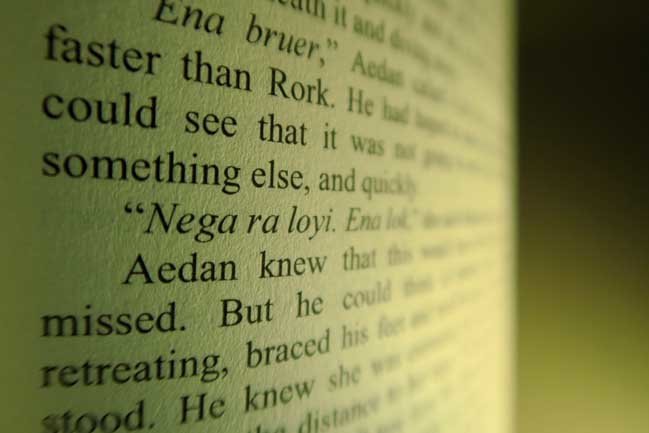A few people mailed, asking how one approaches the business of creating languages, so I decided to share something of my experiences. Firstly, I should point out that while it would have been fun to construct a few complete languages with functional vocabs, it would also have been as useful as varnishing the inside of a couch. I know people have constructed complete languages, and I have only the greatest respect for them, but that’s a monstrous investment that will be largely unappreciated. That’s not to say, however, that I think writers should have nothing under the visible part of their invented-language icebergs, that they should merely close their eyes and launch into babble and gabble.
Here’s some of what I discovered while working on fantasy languages. The most important thing – the languages need to sound real and believable at the same time as sounding otherworldly. It’s a fine balance. Too close to a known language and the fiction is spoiled; too original and they don’t sound like languages at all, just a heap of silly noises. They also need to be distinct from each other, and each occurrence of the language must have the same ring to it. A reader must be able to say, “Oh, yes, that’s what Gellarac sounds like.” The next big consideration is that the grammar rules should vary from one language to the next, while being internally consistent.
 I found the most effective way to do all of this was to learn basic grammar and phrases in several languages using language podcasts. I’d plug headphones into the iPod while exercising and go through the notes at the end. After about two or three months of this, I had a far broader perspective on believable language tones and sentence constructions. The next thing I did was define the sound and basic grammar of the language. The grammar notes weren’t comprehensive. All that was needed was to choose a few noticeable ways in which the languages would be different from English (which is used as Thirnish in my book), and from each other. For the sounds, I decided to blend and modify the tones of two or three existing languages in such a way that they would not remind anyone of the original languages, but would still lend hints of familiarity and therefore believability to the new language.
I found the most effective way to do all of this was to learn basic grammar and phrases in several languages using language podcasts. I’d plug headphones into the iPod while exercising and go through the notes at the end. After about two or three months of this, I had a far broader perspective on believable language tones and sentence constructions. The next thing I did was define the sound and basic grammar of the language. The grammar notes weren’t comprehensive. All that was needed was to choose a few noticeable ways in which the languages would be different from English (which is used as Thirnish in my book), and from each other. For the sounds, I decided to blend and modify the tones of two or three existing languages in such a way that they would not remind anyone of the original languages, but would still lend hints of familiarity and therefore believability to the new language.
It might seem like a lot of work for only a few sentences scattered here and there, but it’s details like these that, I find, either consolidate or spoil the sense of realness. The curious thing about an imaginative world is that the more believable it is, the more it draws you out of your reality into its own.


i love the language keep it up.
I know a very passionate conlanger polyglot linguist that would cringe if you didn’t at least have a grammatical base and tonal (whatever linguist terms he would use) for every language in your book. I’m more of a story guy, but I know there’s a lot of people out there that, once they fall in love with a “fictional world” created by an Author such as yourself, things like languages become much more important for having a “classic” status. One day, if an Author is lucky, he/she may find themselves in a situation where little things like skimping on research and or details (like making a language unique/fitting/ and grammatically consistent) will pay off. Cuz at that point, you may be dealing with pop culture (For example, a movie or TV series is made from your books). Even if it’s just 20 or 30 sentences in existence, if you did your homework before you wrote them, you can have the language flushed out consistently and with cultural nuance by a professional conlanger/linguist without feeling like you got caught with your pants down at least. LOL
Hebrew… “Oh, yes, that’s what Gellarac sounds like.”
I have a language that is solid and never used before made up by my family,what can I really do with it, besides only have conversations with them?